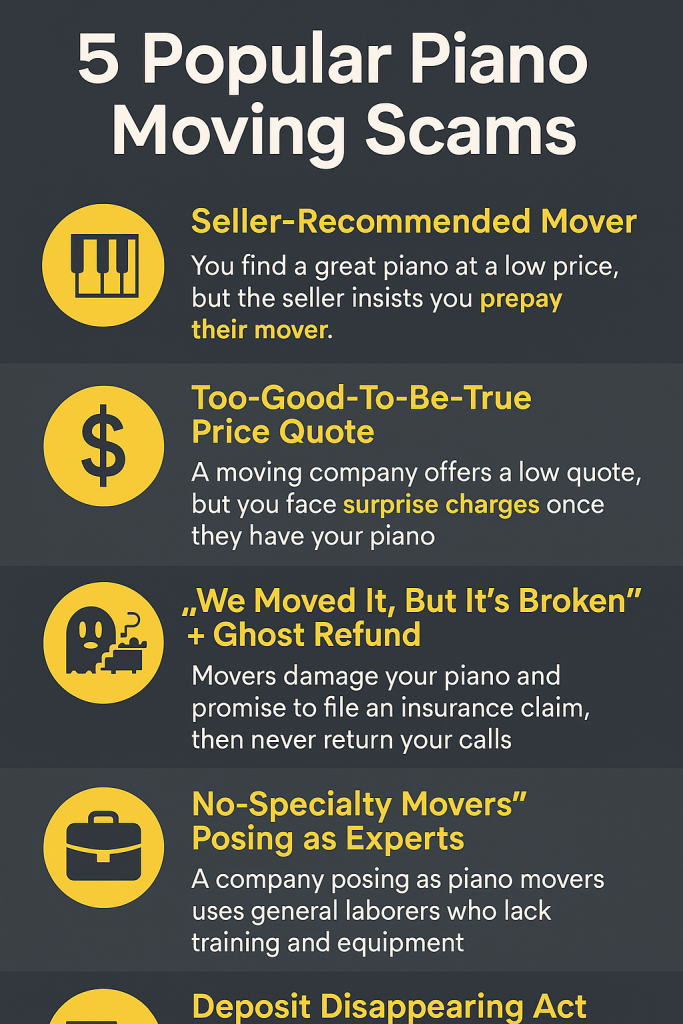You come across an incredible deal on a piano—too good to pass up. The seller seems friendly and says the piano is in excellent condition. But there’s a catch…
Scam Alert: “The Seller-Recommended Mover” Trap
They claim the piano is extremely difficult to move and insist you must use their “trusted piano movers.” They may say it’s in a tricky location, like up a narrow staircase or in an old building with no elevator. Then, they ask you to prepay the moving cost—often anywhere from $200 to $600—before anything is scheduled or moved.
Red Flag: You send the money… and then?
- The “seller” disappears.
- The “movers” never show up.
- The piano either doesn’t exist or was never theirs to begin with.
Why This Is a piano moving Scam:
- The seller and mover are the same person or part of the same fraud ring.
- There is no piano. It was a bait post to get your money.
- Once you send money, it’s gone. You won’t hear from them again, and there’s nothing to move.
- Use platforms like MoversXchange where professional movers are vetted, licensed, and rated by real customers.
✅ How to Protect Yourself:
- Never pay a third-party mover in advance unless you’ve verified them independently.
- Don’t use the “seller’s” mover without doing your own research. If they refuse to let you hire your own, walk away.
- Ask for detailed photos and location info. Scammers get nervous when pressed for details.

Other piano moving scams you may encounter
- Inflated Moving Quotes After Pickup
One typical scam is when movers offer an enticingly inexpensive initial quote only to
raise the fee drastically following the piano’s loading onto their truck. By the time your
piano is loaded, you have two awful options: pay the new inflated price or risk losing
access to your piano.
Tip: Before the job starts, always obtain written quotations from different movers. To
minimize hidden costs, make sure the estimate covers all elements of the
relocation—dismantling, packing, shipping, and assembly. If at all possible, insist on a
fixed rate; otherwise, ask for a thorough justification of any additional expenses. - Unlicensed or Uninsured Movers
Employing uninsured or unlicensed movers carries some risk. Without appropriate
credentials, a moving company might not be liable for damages; without insurance, you
might have nowhere to turn should something go wrong during the move.
Tip: Check the company’s Department of Transportation (DOT) number to find out
about its license and insurance situation. The company’s website allows you to quickly
find this number or ask for it. Reviewing their DOT registration online will help you verify
their legal operation. - Low-Cost Movers with Hidden Fees
Although everyone wants a good bargain, movers with very low rates can tack on extra
expenses following the move. Additional fees for using stairs, packing supplies, or even
the total number of movers needed can often mount up and result in a final cost much
more than initially given.
Tip: Avoid companies that don’t offer a thorough cost breakdown. Before consenting to
any service, seek a complete fee explanation. This way, there will be no surprises when
the bill shows since a respectable mover will be open and give an exact quotation. - No Written Contract or Vague Agreements
A mover who only offers vague terms or refuses to present a written contract could also
be seen as a caution indicator. Without a formal agreement, it’s almost impossible to hold the mover responsible for price adjustments, damage, or other problems that can surface during the relocation.
Tip: Always insist on a contract covering the extent of the relocation, including services rendered, their cost, and the projected delivery time. If the company denies or shows reluctance to do this, you should seek another mover.
- Holding Your Piano Hostage for Ransom
A moving firm keeping your piano captive and not releasing it until you pay a ransom is
among the most upsetting scams. Rogue movers are aware that a piano’s emotional
and financial worth usually justifies you being ready to spend whatever it costs to have it
back, even if the expenses are outrageous.
Tip: If your piano is being held for ransom, notify the local police right away or report a
complaint to the Utility Transportation Commission (UTC). To avoid this
kind of scenario, work solely with reputable, legal, and insured companies. - Damaged or Lost Piano with No Compensation
Pianos are fragile and weighty instruments; hence, they are especially sensitive to
damage during relocation. Certain movers could treat them poorly, damaging or
perhaps losing them completely. You could find yourself without payback if the business
lacks the necessary insurance coverage.
Tip: Check the company’s insurance coverage before the relocation to be sure it covers
valuable things like pianos. Furthermore, if your piano is very expensive, consider
getting more insurance for further security. - Unprofessional Movers and Lack of Proper Equipment
Selecting a piano mover requires professionalism and respect. Unprofessional behavior,
such as late arrivals, inadequate moving tools, or carelessness with your property, could
indicate that the company is not equipped to move your piano.
Tip: Before choosing a moving company, research reviews, check references, and
search for ones focused on piano relocation. Professional piano movers should arrive
ready with dollies, harnesses, and padding—the gear required to carry the piano safely.
Ensuring the safety of your piano depends on working with a recognized professional
piano moving company. Hidden fees, uninsured or unlicensed movers, and unclear
agreements can cause unanticipated costs and possible harm. You can avoid piano moving scams and protect your piano during transportation by carefully investigating moving companies, confirming their credentials, and getting written contracts.